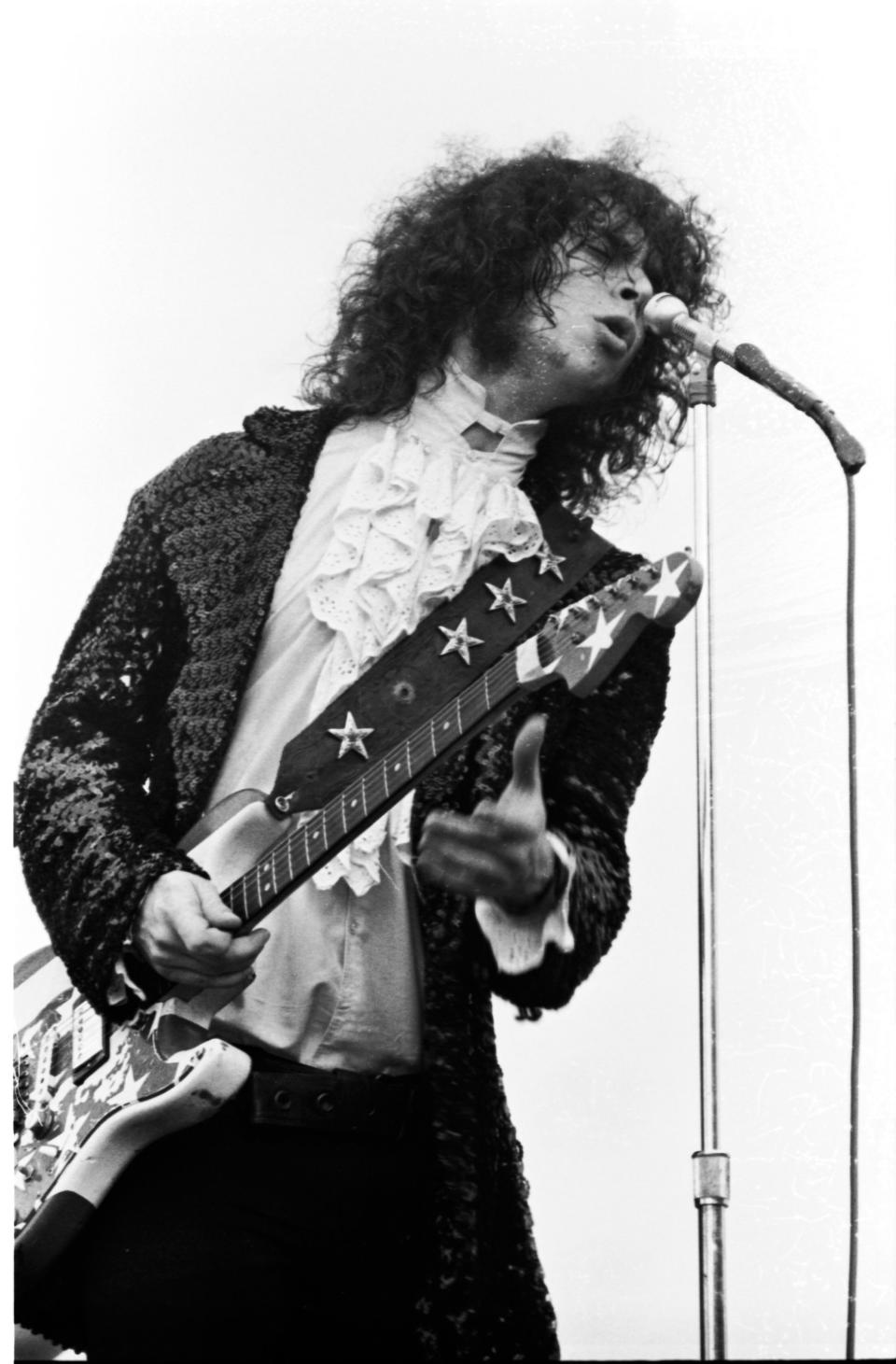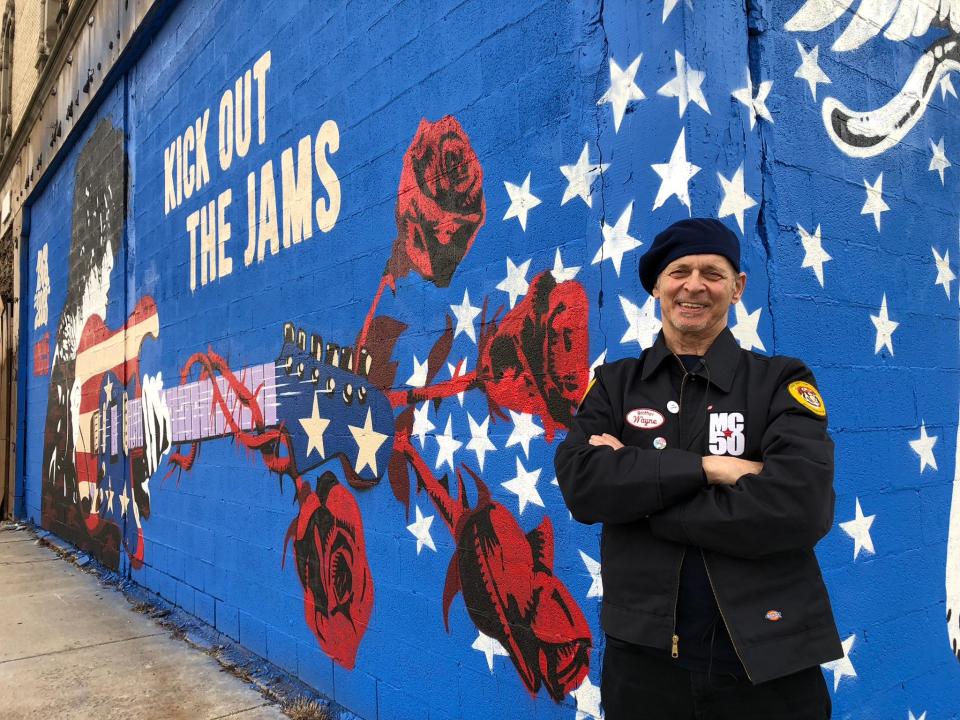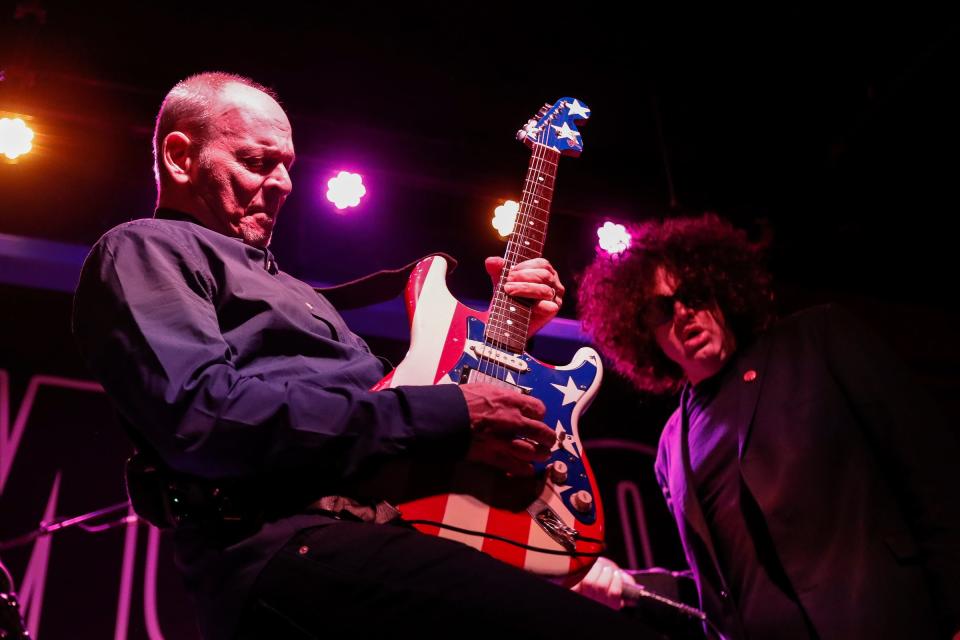Wayne Kramer's musical legacy lives on as fans mourn the MC5 rock icon
- Oops!Something went wrong.Please try again later.
- Oops!Something went wrong.Please try again later.
Wayne Kramer, a quiet giant of Detroit music who helped define the city’s loud rock sound, died Friday after a brief battle with pancreatic cancer. He was 75.
Kramer passed away at Cedars-Sinai Medical Center in Los Angeles early Friday afternoon.
The guitarist brought an articulate sensibility to his explosive musical energy — an approach that fueled the MC5, the group he co-founded in Lincoln Park in his teens. The band’s heavy, revolutionary-minded music laid down a gauntlet for Detroit rock in the late 1960s and went on to wield a stealthy but massive influence for decades.
Kramer is preceded in death by his MC5 bandmates Rob Tyner, Fred Smith and Michael Davis. Of the original core band, drummer Dennis Thompson is the last man standing.
Kramer’s wild ride of a life — hard rocker, jazz musician, film composer, ex-convict, family man — was chronicled in his expressive 2018 autobiography, “The Hard Stuff.”
His childhood unfolded during “a good time to be alive in America — in Detroit in the ‘50s and early ‘60s,” as he described to the Detroit Free Press decades later.

Kramer was diagnosed with pancreatic cancer in January, said Jason Heath, program director with the guitarist's nonprofit organization Jail Guitar Doors, which offers musical programs and instruments to prison inmates. Kramer's recent health issue came four years after he overcame a cancer in his jaw.
"It happened fast. He didn't suffer," Heath said of the latest health battle. "He was surrounded by friends and family."
A versatile guitarist whose early rock ‘n’ roll obsession eventually grew into excursions in jazz and other styles, Kramer embodied a distinctly Detroit aura — a blend of street cred and shrewd industriousness, of raw muscle and musical chops.
Tributes poured in from musicians Friday evening, including Rage Against the Machine’s Tom Morello, who posted on Instagram: “Brother Wayne Kramer was the best man I’ve ever known."
“He possessed a one of a kind mixture of deep wisdom & profound compassion, beautiful empathy and tenacious conviction,” Morello wrote, going on to say: “Wayne had a soft heart but was also Detroit tough as nails.”
Jack White's Third Man Records posted Friday evening: "Rest in power to a brother who dedicated his life to being part of the solution."

With the MC5, Kramer was part of an artistic mission that was often chaotic but always purpose-driven: From their origins playing soul, blues and Motown covers — devoted students of Detroit music — Kramer and company blossomed into a formidable original machine of their own, equal parts macho moxie and social consciousness.
At the band's Cass Corridor home base with manager John Sinclair, the MC5 formed the White Panther Party, rife with militant imagery and progressive themes. Looking back decades later with the Detroit Free Press, Kramer described it as a surrealistic goof.
“We were absurdists,” Kramer said in 2003. “We were not pragmatic about anything we did. We weren’t students sitting around discussing political theory. We found it all to be hysterically funny, and we were goofing on everything.”
Kramer and his bandmates ruled Detroit’s Grande Ballroom, landing an Elektra Records deal and a resulting three-album legacy that included “Kick Out the Jams,” recorded at the Grande in 1968. That debut record’s combustible title track was voted No. 5 by fans and musical professionals in the Free Press’ 2016 project “Detroit’s 100 Greatest Songs.”
The MC5's political forays — including an infamous antiwar performance outside the 1968 Democratic National Convention in Chicago — were secondary to the band's musical drive, Kramer insisted in retrospect.
“All we did was fine-tune and fine-tune and fine-tune our performance so that we left the audience just destroyed,” Kramer told the Free Press. “We didn’t want to entertain them. We wanted to destroy them, so that when they left they had nothing left.”
The diminutive guitarist could be a larger-than-life force onstage, as recalled by Detroit musician and producer Tino Gross, who sneaked into the Grande as a young teen to catch Kramer and the MC5.
“I was riveted. Wayne was in the air for half the show, doing that hang-time thing,” Gross said. “When they were on like that, it was a live show that couldn’t be topped — whether the Who or whoever, I don’t care. It was the toughest act to beat.”
In its time, “Kick Out the Jams” got a shaky reception from the rock establishment, banned by radio stations and retailers for profanity while being skewered by some reviewers. “I took it so hard when Lester Bangs said I couldn’t play my guitar,” Kramer recalled of the famed rock critic. “I was determined that the next record we made, I was going to prove him wrong.”
Kramer said he and his bandmates made sure that sophomore album, 1970’s “Back in the USA,” was a tighter, leaner effort. For many young listeners — including future stars such as the Clash, Nick Lowe and Motorhead, who testified to the impact — it was momentous.
Alongside Michigan contemporaries such as the Stooges, Kramer and the MC5 built a rock template that went on to underpin punk, metal, grunge, garage rock revivalism and more. The band was also a pivotal influence on Detroit compatriot George Clinton, who fused the band's spirit into his Funkadelic work in the ‘70s.
“Wayne set the bar for Detroit rock ‘n’ roll to this day,” said Gross. “The MC5 didn’t have the big hits and the commercial success of (Bob) Seger or others. But everybody knew these were the guys that lit the match and put it to the fuse that launched the rocket. As a guitar player, Wayne was a beast.”
Following the MC5’s bitter split in ‘72, Kramer muddled around in local music projects and took to dealing drugs, landing a federal conviction after an ill-fated sale to agents at a downtown Detroit hotel.
Upon release from prison, he left the area at the turn of the ‘80s, eventually settling in Los Angeles. But his Detroit allegiance remained deep, and he collaborated with local music projects through his final years, including recording sessions and live jams with area musicians during his regular visits home.
His film work included the score for the award-winning 2018 Detroit Red Wings documentary “The Russian Five,” part of a composing resume that included contributions to “Talladega Nights,” “Almost Famous” and Fox Sports.
During the ‘90s, Kramer’s largely well-received solo output included a run with Epitaph Records, most notably his 1995 album “The Hard Stuff.”
That's also when he began to take stock of his musical past, including his initial enthusiastic participation in the now-fabled 2004 documentary “MC5: A True Testimonial.”
But Kramer subsequently helped bury the movie when he took filmmakers to court over music-licensing disputes. The documentary was pulled from screenings and hasn't been publicly available since.
It was an act that divided many in the Detroit music community and the MC5 fan base. Kramer’s assorted MC5 revival projects through the years, undertaken amid skepticism from late band members’ estates, also provoked backlash in some quarters while widely earning positive reviews.
The most high-profile of those outings — a 2018 anniversary tour led by Kramer under the banner MC50 — featured an all-star lineup with members of Soundgarden and Fugazi. The run included three homecoming shows, where Kramer was giddy and energetic onstage as he played to some of his biggest Detroit crowds in years.
During the group’s Saint Andrew’s Hall concert that fall, he nearly broke down in tears during a lengthy audience ovation.

“I’m still in the MC5. I’m a lifer,” Kramer had said ahead of the 2018 shows. “I wanted to do another tour. I’m still fairly spry and in pretty good shape.”
Born in Lincoln Hospital in 1948, the son of an electrician father and beautician mother, Kramer grew up in southwest Detroit, often spending his free time at the Boys Club of America near Livernois and Michigan.
“I’d go in and get toast and listen to the jukebox — it had a big 10-inch speaker,” he told the Free Press. “So when the heavy notes on (Duane Eddy’s) ‘Rebel Rouser’ came on there, it moved me.”
Kramer got his first guitar when he was 10.
“I was very young when I became obsessed with music. I just heard the sound of liberation in Chuck Berry’s guitar playing, in rock ‘n’ roll beats and the exuberance in Little Richard’s singing,” he recounted. “I just said, ‘Yeah, whatever it is — I want more of this.’ ”
His family later settled Downriver, and Kramer’s destiny was shaped by a night at the Detroit Dragway, where the teen caught a set by Michigan rock ‘n’ roller Del Shannon backed by the Ramrods.
“It didn’t get any better than that. There it all was — the power, the danger, the excitement, the sexiness,” Kramer told the Free Press. “It was all right there, on the return road on the other side of a chain link fence. There was my whole future mapped out for me.”
He described his mother as a “vivacious woman” who was streetwise about the world of clubs and rock ‘n’ roll. In a Free Press interview, Kramer recounted a conversation with his mom as he eyed a life in music.
“She said: ‘I want you to do whatever you want to do with your life. But I want to talk to you about being a musician because this is a very, very hard life. You’re up all night and you have to sleep all day.’ And I said, ‘Mm-hmm.’ And she said: ‘You know, there’s alcohol and drugs. It’s always there.’ I said, ‘Yeah, OK, I hear ya.’ And she said, ‘Then there’s loose women.’
“So I wasn’t too sure before she gave me the talking-to, but afterwards I said, 'Don’t throw me in that briar patch.' And she wasn’t lying, either.”
Raw Motor City attitude became Kramer’s stock-in-trade, and it was an ethos he rhapsodized about later in life.
In 2003, reflecting on his MC5 legacy, the guitarist sensed a kindred spirit in another artist who’d recently come to embody Detroit.
“Eminem is really the heir apparent," Kramer told the Free Press. "He’s the only artist out there today that matters. He’s a ferocious lyricist. He is what all artists strive to be — which is, he’s brutally honest. He spills his guts. He opens his heart and his mind up, and he lays it out all there. He splays his guts for you. And he makes mistakes, and he says s--t wrong, and he f---s it up. But his honesty and commitment come through.”
Kramer said that when he watched Eminem’s semi-autobiographical film “8 Mile” in 2002, his reaction was instant: “This is my son!”
Like the eventually cleaned-up rapper, Kramer had his own epiphany, overhauling his life after years of addiction struggles and his '70s prison stint.
By the 2000s, he was married to music industry veteran Margaret Saadi and he became deeply invested in charitable work, including the founding of Jail Guitar Doors, which supplies musical instruments and mentoring to inmates across the U.S., among them Detroit’s Ryan Correctional Facility.
“His legacy is saving lives and giving second chances to incarcerated youth,” said Heath, who has been with the organization since its 2009 start.
Jail Guitar Doors, as Kramer preached, was born of the same impulse that drove the MC5 and his solo work: the transformative power of music.
“By creating something out of nothing by composing a song, you’ve added some beauty to the world," Kramer said in 2018. "You start to see yourself as more than the worst day of your life."
For all the exploits and misadventures, the 75 years of high points and rock bottoms, life as a musician boiled down to one thing for Wayne Kramer. It was a blue-collar lesson fortified in the trenches at Downriver bars, Detroit teen clubs and demanding spots like the Grande Ballroom.
"When people came to see you play, there was only one rule: Were you any good?" he said. "And did you work hard on what you're showing me tonight?"
Kramer is survived by his wife, Margaret Saadi Kramer; his son, Francis Kramer, and his sister, Kat Kambes. In lieu of flowers, the family asks that donations be made to Wayne Kramer's nonprofit group Jail Guitar Doors USA.
Contact Detroit Free Press music writer Brian McCollum: 313-223-4450 or bmccollum@freepress.com.
This article originally appeared on Detroit Free Press: Tributes pour in for MC5's Wayne Kramer following his death

